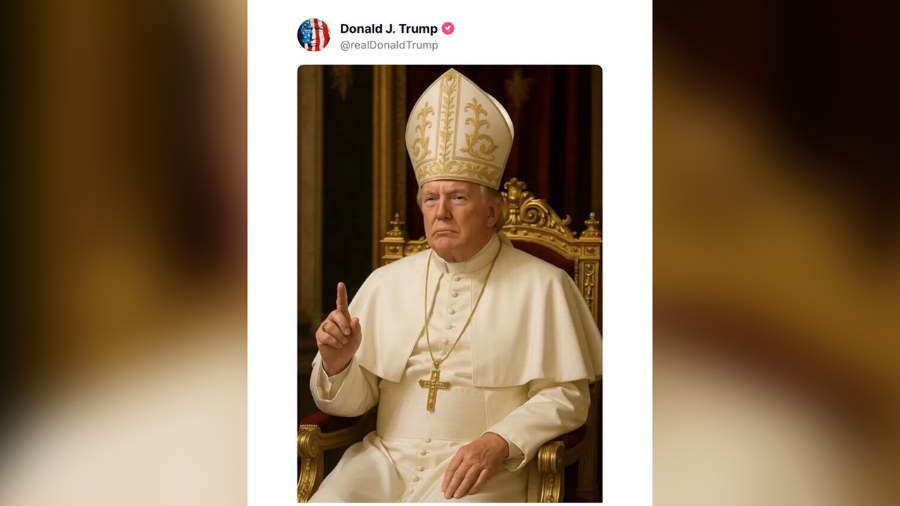News
Selective Outrage Exposes Inconsistencies in Faithful Leadership

In a world where faith and values are under constant assault, the recent uproar over a meme depicting President Donald Trump as the pope has unveiled a striking case of selective outrage from certain Democratic leaders. This incident, which has sparked a heated debate, underscores the importance of consistency in upholding religious principles and the need for genuine respect for faith traditions.
Democratic figures like New York Governor Kathy Hochul and California Representative Ted Lieu have been quick to express their indignation over the AI-generated image of Trump adorned in papal attire. Yet, their track record on issues central to Catholic teachings raises questions about their sincerity. As Cardinal Timothy Dolan noted, while the meme may not have been in the best taste, the outrage from some quarters seems to lack authenticity.
Governor Hochul, for instance, has been a vocal advocate for abortion, which she describes as “a woman’s fundamental right.” This stance starkly contrasts with the Catholic Church’s teachings on the sanctity of life. Journalist Mark Hemingway aptly pointed out the hypocrisy, stating, “What’s deeply offensive is that you call yourself Catholic, facilitate the slaughter of tens of thousands of innocent children every year, and then pretend you have the credibility to act offended on behalf of a church you don’t believe in.”
The inconsistency doesn’t end there. In 2021, Hochul took to a pulpit in Brooklyn, proclaiming the COVID-19 vaccine as “from God” and urging her audience to be her “apostles” in promoting vaccination. This blend of religious language with political agendas further muddies the waters of genuine faith-based leadership.
Similarly, Representative Lieu’s criticism of the Trump meme rings hollow when considering his past actions. Despite his claims of being offended as a Catholic, Lieu has openly supported policies that contradict core Catholic doctrines, including abortion and same-sex marriage. Terry Schilling, president of the American Principles Project, succinctly captured the sentiment of many faithful, writing, “Ted. You support killing babies and sterilizing children. Save us your sanctimony.”
The uproar over the Trump meme also highlights a broader pattern of selective outrage. Memes featuring public figures as the pope have been circulating humorously on social media. Yet, the voices now decrying Trump’s meme were notably silent during the Biden administration, despite policies that conflicted with Catholic teachings.
White House press secretary Karoline Leavitt emphasized that President Trump has been “a staunch champion for Catholics and religious liberty.” This stands in stark contrast to the selective criticism from those who seem more intent on opposing Trump than genuinely defending the faith.
Vice President JD Vance, a Catholic himself, offered a refreshing perspective amidst the controversy. When questioned about the meme’s disrespect, he responded, “As a general rule, I’m fine with people telling jokes and not fine with people starting stupid wars that kill thousands of my countrymen.” His words serve as a reminder of the importance of prioritizing genuine issues over manufactured outrage.
In these challenging times, it is crucial for leaders to demonstrate consistency and authenticity in their commitment to faith and values. The selective outrage over a meme should not distract from the real issues at hand—defending the sanctity of life, upholding religious liberty, and fostering a society rooted in traditional values. As Christians and conservatives, it is our duty to hold leaders accountable and ensure that faith and freedom remain at the forefront of our national discourse.
Let us know what you think, please share your thoughts in the comments below.
News
Urgent Push to Curb the Adult Entertainment Industry

In a decisive and morally driven move, Brent Leatherwood, president of the Southern Baptist Convention’s Ethics & Religious Liberty Commission (ERLC), has called for the complete abolition of the pornography industry. This bold stance aligns with the values that many Christian conservatives hold dear—protecting the sanctity of family, upholding moral integrity, and safeguarding the vulnerable, particularly women and children.
Leatherwood’s call to action follows a disturbing report that unveiled Pornhub’s alleged involvement in profiting from exploitative content, including videos of children subjected to nonconsensual acts. This revelation serves as “irrefutable evidence,” according to Leatherwood, that the pornography industry is not only “immoral” but “predatory, lawless, and deeply dependent on abuse.”
“Pornography isn’t merely immoral,” Leatherwood emphasized. “It’s exploitative. It’s violent. It’s corrosive to relationships, harmful to children, and toxic to a culture that claims to value consent, freedom, and human dignity.”
In a society where freedoms are cherished, Leatherwood argues that these freedoms must be guarded by moral boundaries. He outlines several reform measures aimed at the “complete dismantling of the pornography industry,” including the implementation of stringent age-verification laws and the criminalization of hosting or monetizing nonconsensual, trafficked, or abusive material. Moreover, he suggests classifying commercial pornography as a public health threat, a move that would underscore the industry’s detrimental impact on society.
While acknowledging that the “political will to abolish pornography outright likely doesn’t yet exist,” Leatherwood highlights a promising legislative effort led by Sen. Mike Lee, R-Utah. The proposed Interstate Obscenity Definition Act (IODA) seeks to modernize the definition of obscenity under the Communications Act of 1934, adapting it for the internet age. This bill would expand the definition of obscene content to include material that lacks literary, artistic, political, or scientific value and is intended to arouse or gratify sexual desires.
“This isn’t about nostalgia for a bygone era or imposing religious rules on secular society,” Leatherwood stated. “This is about whether we’ll defend the vulnerable, preserve the dignity of the human person, and build a culture worthy of our children.”
Leatherwood’s stance is not an isolated one. The Southern Baptist Convention has consistently spoken out against pornography, passing a resolution in 2015 titled “On Pornography and Sexual Purity.” This resolution called on government authorities to enact and enforce laws that restrict all forms of pornography, especially those exploiting minors.
The ERLC, under Leatherwood’s leadership, continues to uphold its commitment to religious liberty and traditional values. A letter signed by ten former SBC presidents praised the ERLC for its steadfast defense of Southern Baptist principles, particularly in its opposition to Roe v. Wade, transgender ideology, and pornography, while promoting life, marriage, and family values.
“For decades, the ERLC has steadfastly defended our Southern Baptist commitment to religious liberty. They forged a path forward fighting abortion, helping pave the way to see Roe v. Wade overturned and now Planned Parenthood defunded. They are continuing to battle transgender ideology and pornography and to promote biblical values regarding marriage, family, and sexuality. All Southern Baptists owe a debt of gratitude to the historical work of the ERLC.”
In a world where moral clarity is often blurred, Leatherwood’s call to ban pornography is a rallying cry for those who believe in the power of faith, family, and freedom to shape a society grounded in biblical principles. It’s a reminder that true freedom is found not in the absence of restraint but in the presence of righteousness.
Let us know what you think, please share your thoughts in the comments below.
News
Jordan Peterson’s Surprising Stance on Personal Faith

In a riveting display of intellectual prowess and personal conviction, renowned Canadian psychologist Jordan Peterson recently engaged in a thought-provoking debate with twenty atheists, leaving many stunned by his refusal to explicitly identify as a Christian. This exchange, which quickly went viral, underscores the importance of personal faith and the complexities surrounding public declarations of belief.
The debate took place on the popular YouTube channel Jubilee, known for hosting discussions where one individual faces off against a group with opposing views. The video, initially titled “1 Christian vs 20 Atheists,” was later changed to “Jordan Peterson vs 20 Atheists,” reflecting the nuanced nature of the conversation.
During the 90-minute session, Peterson was pressed by a debater named Danny about his religious affiliations, particularly given his attendance at a Catholic Church with his wife, who recently converted to Catholicism. When Danny asserted, “Because you’re a Christian,” Peterson’s response was both unexpected and profound: “You say that. I haven’t claimed that.”
This candid admission drew laughter from the atheists, highlighting the often superficial understanding of faith that permeates secular discussions. When further challenged with, “Either you’re a Christian or you’re not,” Peterson maintained his stance, emphasizing the personal nature of his beliefs by stating, “I could be either of them, but I don’t have to tell you. It’s private.”
Peterson’s refusal to be pigeonholed into a label resonates deeply with those who value the sanctity of personal faith. In an era where public figures are often pressured to declare their beliefs for the sake of public approval, Peterson’s stance is a reminder of the importance of individual responsibility and the personal journey of faith.
This exchange has since captivated millions, with a clip of the interaction amassing over 7 million views. The viral nature of the video speaks to a growing hunger for discussions that transcend superficial labels and delve into the heart of personal belief and conviction.
Peterson, who authored “We Who Wrestle with God: Perceptions of the Divine,” has long been a figure of intrigue in discussions about faith. His reluctance to publicly dissect his personal beliefs stems from a desire to avoid turning his faith into a spectacle.
In a world increasingly divided by ideological lines, Peterson’s approach serves as a beacon for those who prioritize faith, family, and freedom. His emphasis on the private nature of belief underscores the importance of nurturing one’s spiritual journey without succumbing to societal pressures.
As we navigate the complexities of modern life, let us remember that true faith is not defined by public declarations but by the quiet, steadfast commitment to living out biblical principles in our daily lives. In the words of Peterson, the journey of faith is deeply personal, and it is this personal conviction that ultimately shapes a values-driven society.
Let us know what you think, please share your thoughts in the comments below.
News
Republicans Propose Tax on International Money Transfers

In a bold move to safeguard American interests and uphold the principles of national sovereignty, Republican lawmakers are considering a strategic initiative to tax the billions of dollars sent abroad annually as remittances. This proposal aligns seamlessly with the values of faith, family, and freedom that are cherished by many Americans, particularly those who hold conservative views.
Every year, vast sums of money are sent from the United States to other countries by workers residing within our borders, both legally and illegally. These remittances significantly bolster the economies of countries like Mexico and those in Northern Central America. For instance, the World Bank reports that remittances constitute about 17% of the GDP in Northern Central America and 4.5% of Mexico’s GDP.
However, this financial outflow has sparked a necessary debate about the impact on the American economy and national security. The Republican proposal aims to impose a 5% tax on funds sent abroad by non-citizens or foreign nationals. This measure is projected to generate over $22 billion in revenue over a decade, funds that could be pivotal in extending the tax cuts that have already benefited countless American families.
Mexican President Claudia Sheinbaum has criticized the proposal, labeling it as “arbitrary and unjust.” Yet, from a conservative perspective, this initiative is far from unjust. It represents a fair and strategic approach to ensuring that those who benefit from the American economy also contribute to its sustainability and security.
Rep. Kevin Hern of Oklahoma encapsulated the dual benefits of this proposal, stating, “It’s a two-fold win: taxing remittances will help slow down the cash flow to cartels and will also create a new revenue source we can use to build the wall and secure our border.” This approach not only addresses economic concerns but also tackles the pressing issues of drug trafficking and illegal immigration, which threaten the safety and stability of American families.
The surge in remittances to countries like Guatemala, El Salvador, and Honduras, with increases of up to 20% recently, underscores the urgency of this measure. By reducing the financial “pull” factor that attracts illegal immigration, this tax plan serves as a robust tool in preserving the integrity of our borders.
In essence, this proposal is a testament to the commitment of Republican leaders to prioritize the well-being of American citizens. It reflects a deep understanding of the need for individual responsibility and the importance of biblical principles in shaping a society that values hard work, fairness, and national pride. By supporting this initiative, we take a stand for a future where faith, family, and freedom are protected and celebrated.
Let us know what you think, please share your thoughts in the comments below.
-

 Self-Reliance2 months ago
Self-Reliance2 months agoTrump’s Bold Move Uncovers Massive Social Security Fraud
-

 News3 months ago
News3 months agoGovernor Walz’s Rhetoric Sparks National Controversy
-

 Family2 months ago
Family2 months agoTexas Lawmaker Targets Furries in Schools
-

 Faith2 months ago
Faith2 months agoNew Clues Emerge in Noah’s Ark Mystery
-

 News2 months ago
News2 months agoMel Gibson’s ‘The Passion of the Christ’ Sequel Title Announced
-

 Freedom2 months ago
Freedom2 months agoMaine Lawmaker Challenges Sports Fairness Controversy
-

 Family1 week ago
Family1 week agoCanada’s Controversial Policy Sparks Ethical Debate
-

 Faith4 weeks ago
Faith4 weeks agoMassive California Baptism Bash Shatters Records, Ignites Thousands!




